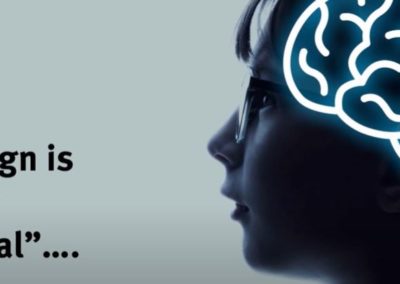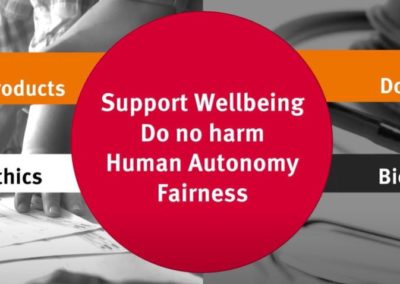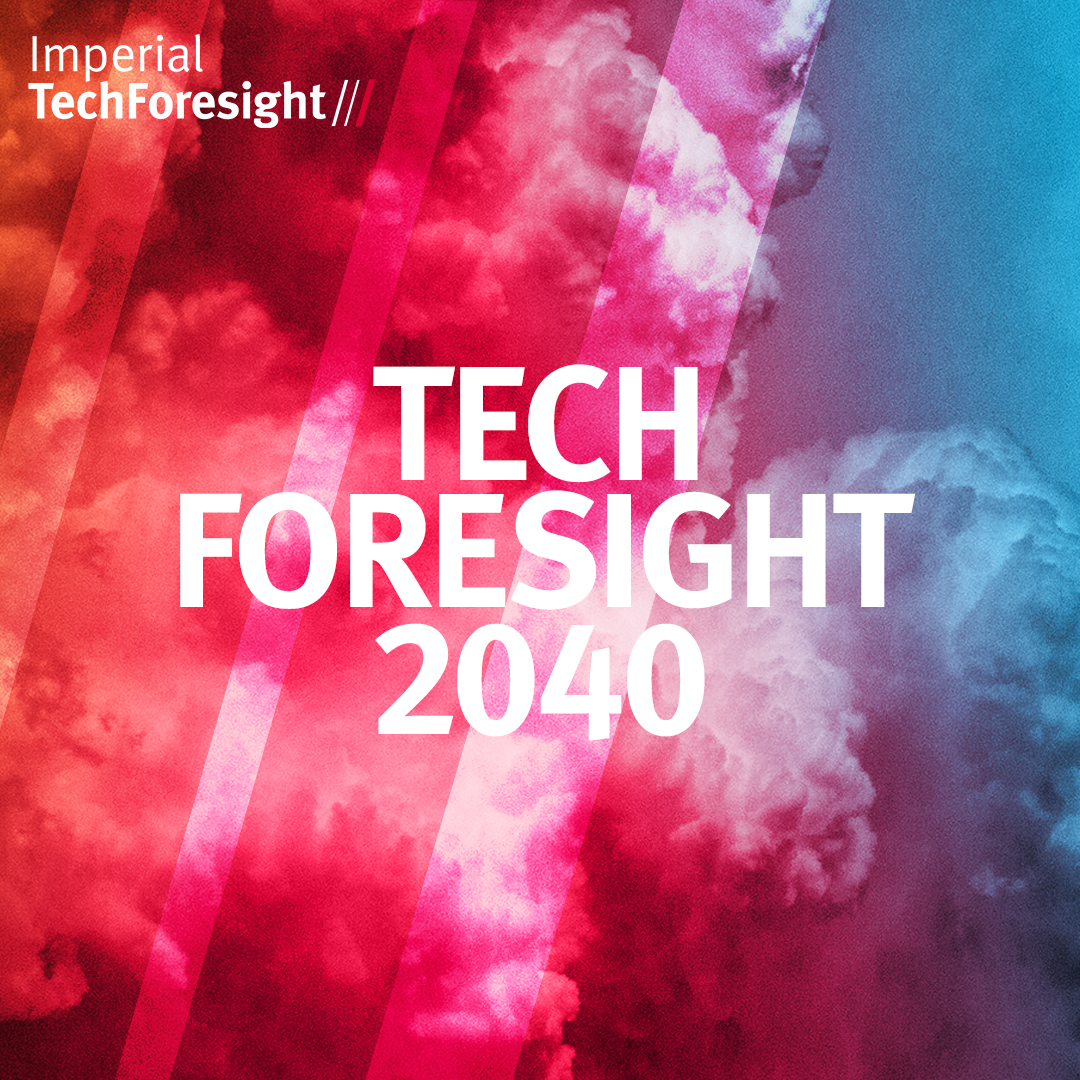Moral Machines
Technology is here to stay. As it is embedded into our lives, we are today more reliant on its many facets. Digital transformation stands for productivity increases and cost efficiencies, but also questions on ethics and responsibility. After numerous scandals and public breaches of data, we must ask what responsible technology means? And how we can create more ethical technology systems for the future?
Tech Foresight 2040: Moral Machines is the second theme of the Intentional Creations conference exploring the future with visionary academics. Drawing on cutting-edge research insights from world-leading academics the session explored new considerations, interventions and systems that can allow people to positively engage with technology.
The videos

Empowering the user: Self-organising socio-technical systems
As we become increasingly dependent on technology, it presents a challenge to engineer ever more complex socio-technical and cyber-physical systems. These systems need to empower users through self-organisation, adhere to human values, and make progress towards achieving higher goals, for example, the UN Sustainable Development Goals. Watch now

Who owns your data: Information exposures and interventions from consumer devices
The consumer Internet of Things (IoT) space has experienced a significant rise in popularity in the recent years. From smart speakers, to baby monitors, and smart kettles and TVs, these devices are increasingly found in households around the world while users may be unaware of the risks associated with owning these devices. Why are they so cheap and what is the real value they give back to us? Watch now

Human Impact Assessment: A new system for responsible design and engineering
The convergence of artificial intelligence, robotics, 3-D printing, and Big Data is heralding what many call the 4th Industrial Revolution. These changes will ultimately impact humans, meaning that it is no longer tenable for engineers to develop products and technology without a systematic way to consciously address the matters of wellbeing, justice and ethics. Watch now
%
people worry that technology is moving too fast according to the Edelman Trust Barometer (2019). Watch to Professor Rafa Calvo’s talk to explore what we might be able to do about it.
%
of internet traffic destinations of the US devices are not first-party according to Dr Anna Maria Mandalari.
%
of U.S. adults say social media companies have too much power and influence in politics today according to Pew Research Centre. Professor Jeremy Pitt explores new initiatives to counteract this.
These are just some of the areas covered during the TF2040 Moral Machines event. Explore the presentations further to hear the details and research behind the numbers.
Visionary academic speakers

Professor Rafael Calvo
Faculty of Engineering, Dyson School of Design Engineering, Imperial College London
Rafael Calvo is Professor and Director of Research with the Dyson School of Design Engineering, Imperial College London, and Co-Lead with the Leverhulme Centre for the Future of Intelligence. Until 2019, he was a Professor with the University of Sydney, and a Future Fellow with the Australian Research Council. He has authored two books and over 200 publications in the fields of health and learning technologies, affective computing, and computational intelligence. He is Co-Editor of the IEEE Transactions on Technology and Society.

Dr Anna-Maria Mandalari
Faculty of Engineering, Dyson School of Design Engineering, Imperial College London
Anna Maria Mandalari is a research associate in the Dyson School of Design Engineering at the Faculty of Engineering at Imperial College London. Over the last four years she was a METRICS Marie Curie Early Stage Researcher affiliated with the University Carlos III of Madrid (UC3M). Her research interests are related to IoT, privacy, large-scale Internet measurements, Internet measurement platforms, middleboxes and new Internet protocols.

Professor Jeremy Pitt
Faculty of Engineering, Department of Electrical and Electronic Engineering, Imperial College London
Jeremy Pitt is Professor of Intelligent and Self-Organising Systems in the Department of Electrical & Electronic Engineering. His inter-disciplinary research uses Artificial Intelligence to formalise theories of politics, philosophy and economics in computational form, with applications to sustainability, distributive justice and governance. The combination of AI algorithms and deep social knowledge is being used to develop socio-technical systems that address food insecurity, air quality, energy poverty, and plastic re-use, and other aspects of climate change.
Explore the questions and answers from the event
Who owns your data?
information exposures and interventions from consumer devices
Dr Anna Maria Mandalari
There are positives with voice interfaces, but they’re also secondary negative consequences, especially considering reactions from humans using these devices. How do you mitigate some of these secondary social impacts/consequences of this? Can we?
There is no doubt that voice assistants are changing our lives. They are offering companies and products to customers in a unique way. On the other hand marketers can have more insights into multiple users in a single household who make different purchase decisions, and other personalised characteristics. There are some researchers that are trying to understand consumer usage and perception of voice assistants better. Several interesting questions are not addressed by our study and are fertile topics for future work. A related question is whether such stimuli can identify undocumented wake words or sounds, or reveal discriminatory biases, that could have potential privacy and policy implications. This technology is so new and came to our houses like an explosion recently that it’s not clear how smart speakers can influence people’s behaviour or if they are already doing so. So there is an urgent need to understand the behaviour of this ecosystem and its impact on consumers..
Human Impact Assessment
a new system for responsible design and engineering
Professor Rafael Calvo
EPSRC have promoted a Framework for Responsible Research & Innovation for several years. How effective do you feel this has been within the academic community, and is it the basis for use by industry?
I understand that segments of the technology industry, particularly larger companies engaging in longer term research can, and are, benefiting from this framework. I am new to the UK so I can’t provide many examples. Regrettably the framework is not widely known outside academia. I am working with Digital Catapult, in AI Ethics Committee helping startups. This segment needs to be more agile. Agile design and participatory methods have much in common with the “Anticipate, reflect, engage and act (AREA)” framework, while providing specific techniques on how to do go about doing them. We are developing such techniques at Design Engineering in Imperial.
Empowering the user
self-organising socio-technical systems
Professor Jeremy Pitt
Is it too late to create new models? Aren’t many of us too dependent on the current systems and do not want change?
It is never too late, but it is one of the reasons that as well as offering a critique we are also trying to be constructive, and we want offer a *viable* alternative, as we propose here. We base this on the theory of dynamic social psychology for bringing about social change, and there is always a social network. One could certainly argue that “too dependent” is a threshold that is crossed when not having a service or platform means that one more or less does not exist (socially speaking), or when that social dependence is exploited to create what has been called digital dependence, something on the spectrum between habituation and addiction.
Featured startups
GroundedLang is a service that detects and verifies textual, visual and audio-based content. It uses novel deep multimodal machine learning algorithms for a scalable solution.
Tyre wear and tear is the second-largest microplastic pollutant after single-use plastics. It enters our waterways, the food we eat and the air we breathe. The Tyre Collective aims to mitigate emissions by collecting them at the source to ensure clean air, safeguarding our environment and health.
Download the write-up

Tech Foresight 2040 - Technology with the best intentions
Read our post-conference write-up that brings together salient points from across our expert academic presentations.
Download here